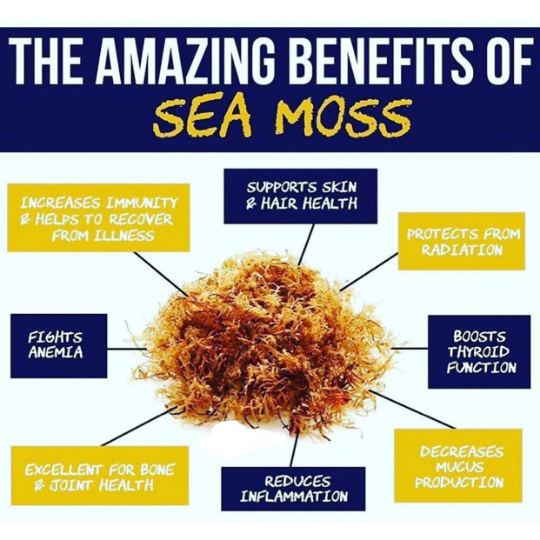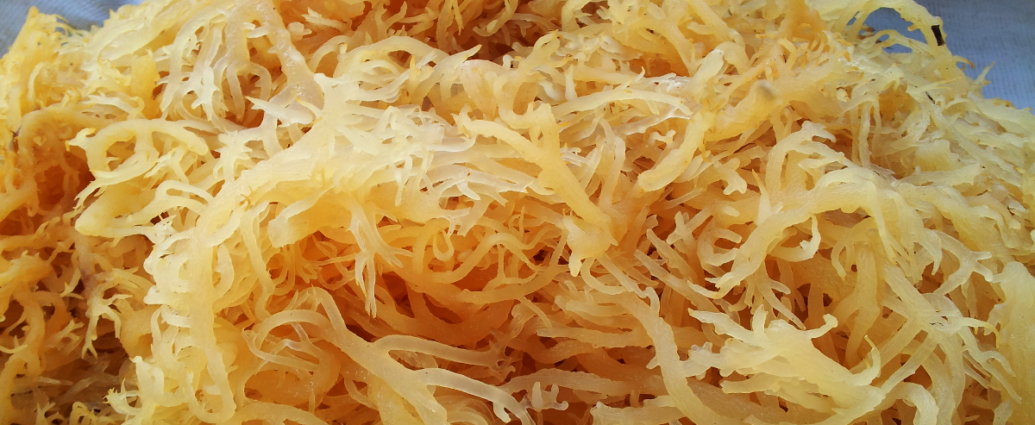What is sea moss, exactly?
In its simplest terms, sea moss—aka Irish sea moss—is a type of red algae believed to boost your health and enhance your skin. While it lacks significant science to back up the benefits, experts say it has some stand-out advantages, and other cultures have turned to it for years to improve health. “Irish sea moss has been used for generations in places like Ireland, Scotland, and Jamaica in food and as folk medicine,” says Robin Foroutan, R.D.N., spokesperson for the Academy of Nutrition and Dietetics. In these cultures, it’s often used to help enhance the immune system and fight off colds. (Related: 12 Foods to Boost Your Immune System)

Also know as carrageen, this type of algae grows on the rocky parts of the Atlantic coast of the British Isles, as well as around Europe and other parts of North America, according to the Encyclopedia Britannica. Most people don’t eat it plain but rather as a gel (created by boiling raw or dried forms in water) and often as a thickening agent. Other cultures also serve it as a drink, boiled with water and mixed with milk and sugar or honey. These days, you’ll likely find sea moss in a powered or pill form.

What are the benefits of sea moss?
When ingested…
When made into a gelatin-like consistency and added to foods like your morning smoothie, sea moss can soothe the respiratory tract and digestive tract, says Foroutan. (It doesn’t have much flavor, so it should just contribute to creating a thick texture.) This might be due in part to the fact that, like aloe and okra, Irish moss is a mucilaginous food, which mucus-like texture (sticky, thick) can double as a remedy for irritation. This snotty-substance also dissolves in water, so sea moss can tend to act like a soluble fiber. Remember: soluble fibers dissolve in water and become a soft-gel that keeps you full and helps stool move through the GI tract.
Sea moss is also a prebiotic, which is a type of dietary fiber that’s essentially fertilizer for probiotics (healthy bacteria in your gut) and, thus, helps further support digestion.
Although low in calories—49 per 100g, according to the Food and Drug Administration (FDA)—sea moss is loaded with key minerals such as folate, which is essential for prenatal health and development. It’s also high in iodine, which is “is important for promoting the development of normal breast tissue,” says Foroutan. “Iodine is [also] super fuel for the thyroid.” Iodine helps the thyroid run properly and make thyroid hormones, which regulate metabolism, encourage bone and brain development during pregnancy and infancy, among many other important functions, according to the National Institutes of Health (NIH). (Related: The Best Prenatal Vitamins, According to Ob-Gyns—Plus, Why You Need Them In the First Place)
Also, because sea moss is high in immune-boosting nutrients like iron, magnesium, phosphorus, and zinc, it may also support the immune system and help you fight off cold and flu symptoms, adds Foroutan. One 2015 study on rats found that sea moss’ prebiotic effects improved their gut microbiome, which led to heightened immunity. (Speaking of which, did you know that your gut microbiome can also impact your happiness?)

When applied topically…
Sea moss offers antimicrobial and anti-inflammatory properties, which means it can help with issues like acne and aging skin, says Joshua Zeichner, M.D., director of cosmetic and clinical research in the department of dermatology at Mount Sinai Hospital in New York City. “It’s rich in sulfur, which is known to lower levels of microorganisms on the skin and soothe inflammation.”
“Sea moss also contains vitamins and minerals like magnesium, vitamin A, vitamin K, and omega-3 fatty acids, which help to hydrate and promote healthy skin cell function,” he adds. While there’s no scientific evidence on the amount of sea moss you should look for in a product to reap the skin benefits, it’s best to use it topically so your skin can absorb the vitamins and minerals. (Related: These Seaweed Facial Products Will Give You Glowing Skin)
While all these potential pros are exciting, it’s important to keep in mind that there isn’t a lot of concrete evidence (yet!) backing the benefits of sea moss. In fact, there’s very little research on the ingredient in general, and this might be due to the fact that algae (including sea moss) are difficult to study. The nutritional properties (vitamins and minerals) vary by location and season—plus, it’s hard to determine how well the body absorbs the nutrients in algae and how its metabolized overall, according to an article in the Journal of Applied Phycology.
But, again, other cultures have believed in it for years so it could still offer some pay-offs. “When folk remedies persist through the generations, you can pretty much guarantee that there’s some kind of benefit, even if science hasn’t quite caught up with the why and how,” says Foroutan.
Are there any downsides to sea moss?
While iodine can promote health in some people, it might pose risks for those with autoimmune thyroid conditions, like Hashimoto’s—a disease in which the immune system mistakenly attacks the thyroid gland—too much iodine can trigger hypothyroidism, says Foroutan. In those with Hashimoto’s, too much iodine can trigger hypothyroidism, a disorder that occurs when the thyroid doesn’t make enough thyroid hormones, according to the Cleveland Clinic.
Also, though it’s rare, you can overdo it with iodine, potentially leading to a goiter (enlarged thyroid gland), thyroid gland inflammation, and thyroid cancer, according to the NIH. You might also experience burning of the mouth, throat, and stomach, a fever, stomach pain, nausea, and vomiting. So, moderation is key here—the FDA recommends sticking to 150 mcg of iodine per day. Because the nutritional value of Irish moss can differ based on where it’s from, so can the amount of iodine in each serving. For reference, three ounces of baked cod can have about 99mcg of iodine and 1 cup of reduced-fat milk can have about 56mcg. Meanwhile, one sheet (1 g) of seaweed can have anywhere from 16 to 2,984 mcg of iodine, according to the FDA, so it’s important to pay attention to nutrition labels if you’re eating sea moss and worried about iodine consumption. (That being said, iodine deficiency amongst fit women is very much real and on the rise.)
While some people opt for the powdered or pill route when it comes to sea moss—likely because it’s more convenient than having to make the gel—anytime you’re trying a new supplement, it’s a good idea to talk to your doctor to make sure it’s safe for you. And as with any supplement, the FDA doesn’t regulate the substance, so make sure you’re getting a quality product by looking for labels with a United State Pharmacopeia (USP), National Science Foundation (NSF), UL Empowering Trust (or just UL), or Consumer Labs stamp, says Foroutan. These letters mean third parties tested for dangerous impurities and that the label matches what’s inside the bottle.
Of course, if you’re experiencing any negative side effects, like itchy throat or nausea (signs of a food allergy), stop taking sea moss and see a doc. If you’re using sea moss as a mask or cream, it’s important to watch for irritation, like redness, burning, or stinging, says Dr. Zeichner. Stop using it if you experience any of these symptoms of an allergic reaction and talk to your dermatologist if you’re worried.
While some beauty products get an “organic” label, Dr. Zeichner says there’s no true definition for that when it comes to skin care so it doesn’t make it a must-buy. The term applies to foods, rather than beauty products, plus it’s unclear whether organic sea moss extract works any better (or is any safer) than those without the organic stamp.

